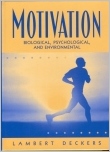| |||||
• polskie
• Zamów informacje o nowościach z wybranego tematu • kontakt |
MOTIVATION BIOLOGICAL,PSYCHOLOGICAL AND ENVIRONMENTALDECKERS L.wydawnictwo: A&B, 2001, wydanie Icena netto: Motivation
Biological, Psychological, and Environmental1st Edition Lambert Deckers 2001 448 pages (est.) 0-205-27115-4 (Hardback) Motivation refers to the inducement of action, feelings, and thought; Motivation identifies what the sources of inducement are. Well-grounded in the history of the field, Motivation: Biological, Psychological, and Environmental combines classic studies with current research. In addition, the author employs a conversational writing style designed to retain student interest. Use of illustrative examples drawn from literature, film, music, and the visual arts enhances this approach and makes the material wholly accessible to those who use the text.
1. Introduction to Motivation and Emotion. 2. The History of Motivation and Emotion. Biological Sources of Motivation. 3. Evolution of Universal Motives. 4. Drug Use, Brain Stimulation, and Exercise. 5. Homeostasis: Temperature, Thirst, Hunger and Eating. Internal and Psychological Sources of Motivation. 6. Arousal, Behavior, and Affective Tone. 7. Stress, Coping, and Health. 8. Drives, Needs, and Awareness. 9. Personality and the Self in Motivation. External and Cognitive Sources of Motivation. 10. Extrinsic and Intrinsic Motivation. 11. Goal Motivation. 12. Least Effort and the Economics of Motivation. The Emotions. 13. The Subjective and Physiological Nature of Emotion. 14. The Unfolding and Function of Emotion. Księgarnia nie działa. Nie odpowiadamy na pytania i nie realizujemy zamówien. Do odwolania !. |


